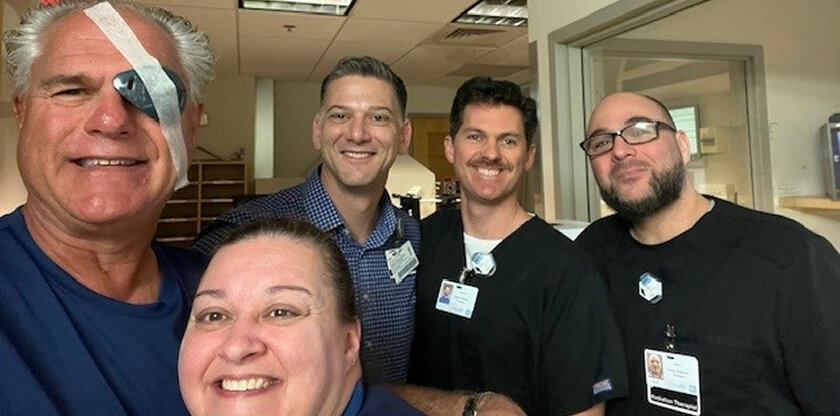
Doctors’ Day: Compassionate Care in Treating Choroidal Melanoma
When Michael Klein received his cancer diagnosis, choroidal melanoma of the left eye, it was a frightening time.
"It was one of the most terrifying moments that I have ever had," Michael said.
However, his outlook changed dramatically after meeting Roi Dagan, MD, MS, a radiation oncologist at the UF Health Proton Therapy Institute and associate professor of radiation oncology at the University of Florida.
"Speaking with him really gave me a lot of comfort," Michael said.
Dr. Dagan said that Michael was an excellent candidate for proton therapy and reassured him that after treatment the chance of recurrence was minimal—5–10%. This encouragement transformed Klein’s perspective, galvanizing him to believe he would become a survivor.
According to UFHealth.org, the choroid layer is the layer of blood vessels and connective tissue between the white of the eye and the retina, or the back of the eye. Melanoma is an aggressive type of cancer that can spread rapidly. While melanoma is usually a type of skin cancer, the choroid layer is the most likely site for melanoma of the eye.
Michael’s path to the UF Health Proton Therapy Institute began with a referral from his ophthalmologist at Ocala Eye to the Mayo Clinic. While at Mayo, his physician suggested a few different treatment options. One of those was proton radiation therapy. Trusting this recommendation, Michael chose to proceed with treatment at the UF Health Proton Therapy Institute.
His treatment took place over four days in January.
“Dr. Dagan said that I would experience the worst case of conjunctivitis that I’d ever have,” Michael said. “He was very honest.”
The compassionate and attentive staff, combined with Dr. Dagan's constant encouragement, eased his fears and made him feel truly supported throughout his treatment.
Michael noted that the warmth and personalized care he received began from the moment he walked through the doors.
"It was as if I were the only cancer patient that ever existed," he said.
Michael’s journey also led to a unique connection with another patient. Sharing identical diagnoses and surgery dates, the two formed a bond that added a lighthearted element to their treatment. This camaraderie, along with the steady support from the UF Health Proton Therapy Institute team, reinforced Michael’s belief in the power of compassionate care.
To others facing similar health challenges, Michael emphasized the importance of choosing a treatment center that offers both advanced medical options and a deeply supportive environment. He credits the UF Health Proton Therapy Institute for not only providing cutting-edge proton therapy—a precise form of radiation that targets tumors while minimizing damage to surrounding healthy tissue—but also for nurturing a community where patients never feel alone.
A couple of months after his treatment, Michael acknowledges the challenges of recovery but is grateful for the progress he has made. With renewed strength and improved health, he is feeling better each day and optimistic about the future.
“I will always be grateful for their kindness and expertise that gave me a victory from cancer,” he said.
Share your gratitude!
If you would like to make a gift in honor of the UF Health Proton Therapy Institute physician who has cared for you or a loved one, and share a note of thanks visit:
UF Health Proton Therapy Institute » Giving » UF Health » University of Florida

